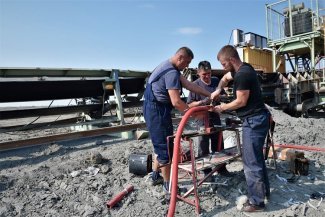
Saleemul Huq (left), the director of the International Centre for Climate Change and Development, and Swedish business minister Karl-Petter Thorwaldsson (right) both believe that the transition to a low-carbon company should not leave fossil fuel workers behind.
For Saleemul Huq, the climate debate has moved well beyond being a mere environmental issue. According to the director of the International Centre for Climate Change and Development (ICCCAD), the climate crisis is an issue of justice, equity and equitable development that concerns everybody. Karl-Petter Thorwaldsson is Sweden’s minister for business, industry and innovation, and a former president of the Swedish Trade Union Confederation. Sweden, he says, has shown that being an environmentally friendly country can be more profitable than being fossil fuel-dependent.
Equal Times recently sat down with both men to discuss solutions to ensure that workers aren’t left behind in the transition to a fossil-free world. You can scroll down to watch the videos.
Mr. Thorwaldsson, what have been the challenges and opportunities of transitioning to a low-carbon economy in Sweden?
Karl-Petter Thorwaldsson: That has been a big question for companies since we started working on the goal of being fossil-free by 2045. At first, a lot of the companies only talked about the extra cost, the loss of jobs, etc. But when they started to evaluate their business, they saw that they could actually earn more money by transforming into carbon-free industries. For instance, the biggest challenge is for the steel industry. In Sweden, they started a project called ‘hybrid’ between the state mining company LKAB and the biggest electric power company, Vattenfall. It started a couple of years ago and they produced the first fossil-free steel in the world in early 2022. And actually the demand for fossil-free steel in the rest of the industry, the rest of Europe, the rest of the world is very big. So they actually decided to make this change 15 years earlier, so in 2030, because they can earn more money from selling fossil-free steel than what they actually make when they compete with others in the fossil-dependent steel sector. So for them and for many others, we see that when they make these changes, the market can be very welcoming towards these new products.
Mr. Huq, how would you define just transition (in the context of energy transition)?
Saleemul Huq: Just transition refers to the industrial workers of the fossil fuel energy sector who may have to sacrifice their jobs, in order for us to wean ourselves off fossil fuels as quickly as possible, but they need to be retrained; they need to be looked after. They need not to be the ones who suffer the consequences of this transition. And that’s what we mean by just transition. And it’s good to see that labour unions around the world are coming on to that. They are not fighting to preserve those jobs, but they are fighting to have good and better jobs going forward.
How do you think social dialogue can contribute towards a just transition?
S.H.: Well, I think one of the realisations that we’ve had over the last 30 years of being aware of the climate problem, and the climate problem getting much worse over that time, is that it is a whole-of-society approach. It’s not something we can leave to our leaders to solve by themselves. First of all, they haven’t done it. And secondly, they can’t do it, even if they want to do it. They need involvement of all the sectors of society, employers and employees, in the formal sector, in the informal sector, people who are working there, farmers, fishers, schoolchildren – everybody needs to be involved. The good news is that’s beginning to happen. Almost everyone with some level of literacy and knowledge, general knowledge, around the world, is aware of the climate change problem; is aware of the problems they are facing in their own localities, in their own countries.
And by the way, climate impacts are now happening everywhere, even in rich countries. So it’s no longer just poor countries that have to worry about that. Even rich countries have to worry about it. And so this is a uniting factor in terms of all people realising this is something that requires collective action and all sectors of society need to be involved in discussing what needs to be done, obviously, at the local level, at the national level, but also at the global level as well. And increasingly, you see the United Nations meetings, the COPs, that are held every year, are not just the government leaders who sit behind closed doors and negotiate. There are thousands of other people who go there. I don’t go as a negotiator. I go as an observer, and I network with other observers. And there are many, many more people getting involved in trying to solve the problem now, which is a good sign. The question is, it’s not happening fast enough. We need to make it happen faster.
Mr. Thorwaldsson, how can Sweden reach carbon neutrality by 2045?
K-P.T.: We divided our objective into 22 programmes, together with the industry. Then we talk to all businesses and we try to tackle the problems together. For instance, for electric mobility [such as] cars and trucks, Sweden is a huge producer of trucks and cars and the industry now says that, by 2030, they can change all the fossil fuel engines to battery. So what we did, in the government, is to invest together with the industry in three electromobility centres where they can actually test and evaluate their products for batteries. And that was supported by the state and by the European Union. Together with the industry, we have now invested some 350 million [Swedish crowns, about €34 million; US$38 million] in that technology change. And after that, battery factories came to Sweden and asked if they can invest as well. So now, one of the big new industries in Sweden is the battery industry. It started in Skellefteå, in the north, where we have cheap electricity, by a company called Northvolt. They are now building a totally new battery industry. They will employ about 3,000 people, so that’s a record for a new company. Thus, there are more jobs created by this change than there are jobs that will be lost in the old, fossil-fuel dependent economy. So we’re very optimistic.
How are the Swedish workers reacting to these changes?
K-P.T.: In the start, they were very sceptical about the rapid changes we want to implement in Sweden in order to be carbon neutral by 2045. So there was an agreement signed between employers and trade unions, where they also asked the government for support in order to retrain people who are in their mid-life. That was put in place on the first of January 2022 and it’s actually a fantastic plan and we are really happy to provide the market with that. For a lot of people who started in an industry, whether they are managers or blue collar workers, changing careers in their mid-life is very difficult, especially if you’re providing for your family or if you have a mortgage on your house. It’s too expensive to take a year off, so this new plan gives the possibility for everybody in Sweden to have a year of training with 80 per cent of their former salary in order to reskill.
Mr. Huq, what needs to change, at the political level, to make just transition happen?
S.H.: Well, politics is always a difficult process and politics is always very short-term. Politicians have very short periods in office, and anything they do which will have fruits in the long-term are very low on their priority. They need results very quickly. And so it’s a very difficult thing and that’s why we haven’t had as much movement as we should have had. But nevertheless, an electorate that understands the need for making investments now that will give fruits years from now are the ones that need to make the politicians understand that they will actually vote for them if they make that promise. And, hopefully, that will happen.
Mr. Thorwaldsson, how can European trade unions be fully involved in this just transition?
K-P.T.: I think that dialogue with trade unions is crucial and it’s really easy in countries such as Sweden, Norway, Finland; the countries around here have a dialogue with employers. And I want to send a message to my political friends around Europe, especially in former Eastern bloc countries like Slovakia, Czech Republic, Poland and Bulgaria. There, they have just transition programmes funded by the European Union but they don’t even invite trade unions to the talks about just transition. I think Europe should say to all the member countries: “If you don’t invite workers, if you don’t invite the trade unions, I don’t think you should be able to access these funds, because they must be a part of this rapid transition of the economy.” So I firmly believe that we should always invite the trade unions.
Mr. Huq, how can climate change be addressed without risking more inequality worldwide?
S.H.: It has to be addressed in a system of solidarity across the globe. If we don’t have solidarity, then we cannot address it. And at the moment we don’t. What we have is rich people looking after themselves. And if it costs them US$1, they’re not going to spend that US$1. On the other hand, poor people are losing US$100. And the rich people don’t care. So people are losing right now. The cost is being felt by poor people in poor countries with the rich people who are causing the problem who don’t care. So we need them to care.
[VIDEO - Saleemul Huq, director of the International Centre for Climate Change and Development]
[VIDEO - Sweden’s minister for business, industry and innovation Karl-Petter Thorwaldsson]












